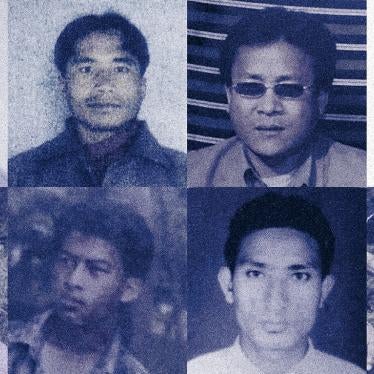Her Excellency Pratibha Devisingh Patil
President of the Republic of India
Your Excellency:
We understand that you will be paying an official visit to the United Arab Emirates this week, and that during your visit you will inaugurate a new Overseas Indian Workers' Resource Center that will assist distressed Indian workers by monitoring their grievance petitions and offering them a 24-hour hotline. While relief measures for workers who have faced abuse are an important step, Human Rights Watch urges you to use this critical opportunity to advocate for legal and policy reforms by the UAE government that will better protect the rights of Indian workers there.
In particular, we urge you to call for the UAE government to take meaningful steps, listed below, to stop the exploitation of migrant workers, the prevalence of which Human Rights Watch has documented over the past five years. UAE federal labor law offers a number of protections, including prohibiting charging workers visa and travel fees, but does very little to enforce these laws. Across the UAE, abuses include nonpayment of wages, unsafe working environments leading to deaths or illness, squalid living conditions in labor camps, and withholding of passports and travel documents. Female domestic workers suffer unpaid wages, food deprivation, long working hours, forced confinement, and physical or sexual abuse and are not protected under UAE labor law. Last month, UAE Labor Minister Saqr Ghobash Saeed Ghobash announced that the government would not abolish the restrictive kafala or immigration sponsorship system that requires workers who wish to change jobs to seek their sponsoring employers' consent-even when employers have violated their rights.
Human Rights Watch continues to report extensively on human rights abuses faced by migrant construction workers in the United Arab Emirates, as illustrated in our 2006 report, Building Towers, Cheating Workers, and our 2009 report, The Island of Happiness, copies of which we enclose for your attention. Follow-up research conducted in 2010, including interviews with Indian construction workers and manual laborers in Dubai, Sharjah, and Abu Dhabi, revealed that these workers continue to pay burdensome recruitment fees and remain unable to change or quit jobs when they wish to do so.
- 1. Recruitment fees: Exorbitant recruitment fees charged by recruitment agents in workers' home countries remain a key factor in creating conditions of forced labor. As a matter of first priority, we ask you to prevent recruitment agencies in India from charging workers fees for travel, visas, employment contracts, or anything else as a condition for them to work in the UAE. The rights of Indian workers, who make up the largest percentage of the UAE labor force, remain under threat as long as these workers remain heavily indebted and under the unchecked control of sponsoring employers who exploit workers' vulnerability. We also ask you to work with Emirati authorities to prohibit companies from doing business with recruitment agencies, in the UAE and India, that charge fees in contravention of Emirati law, and to prosecute and implement significant penalties for employers and recruiting agencies that violate the law.
- 2. UAE government enforcement of payment of worker wages: Over the past two years, the situation for many migrant workers has worsened because of the financial crisis that began in late 2008. According to estimates from your government, tens of thousands of Indian workers in the UAE have lost their jobs. Workers we interviewed said that some employers forced them to accept reduced pay and benefits or face dismissal. And despite a mandatory electronic payment system introduced in 2009 that requires companies to pay salaries directly into licensed banks to ensure timely payments without illegal deductions, workers complained of nonpayment of wages. We ask you to call on the UAE government to substantially increase the number of inspectors responsible for overseeing the private sector's treatment of migrant workers, and to impose meaningful and consequential penalties on companies that violate workers' rights, including wage nonpayment.
- 3. Passport confiscation: Employers nearly uniformly confiscate workers' passports upon their arrival in the UAE, often with the stated rationale of keeping the documents "safe" for the employees, despite an Emirati court decision deeming the practice illegal. Passport confiscation gives employers even greater control over workers in their employ. Some workers have reported that companies refused to return their passports to allow them to attend relatives' weddings or funerals in their home countries. While UAE and international law prohibit passport-confiscation as violating the right to freedom of movement, UAE laws also provide a perverse incentive to confiscate passports: companies face heavy fines if they fail to request the UAE government to cancel "absconding" workers' visas, and the accepted cancellation procedure is for companies to turn in the workers' passports to the Ministry of Interior. As Indian nationals' passports remain property of the Indian government, we ask you to work with Emirati authorities to ensure that these documents remain with their bearers rather than in employers' possession.
- 4. Labor law protection for migrant domestic workers: We also hope you will use your visit to call attention to the plight of Indian domestic workers in the UAE. The UAE labor law specifically excludes domestic workers from its provisions, depriving them of legal protection for limits on working hours, a minimum wage, overtime pay, and mandatory holidays. Domestic workers' exclusion from the labor law, as well as the practice of requiring them to submit complaints to the Interior Ministry rather than Labor Ministry leave them at an even greater disadvantage when employers violate their rights. The UAE government should afford domestic workers the same protections as other workers by protecting them under the country's labor laws and including them under the Labor Ministry's authority.
While many of the abuses workers face are committed by private employers, the Emirati government has not done enough to crack down on such violations or to enforce its own labor laws. We believe that the significant Indian diaspora working in the UAE gives you considerable influence and a unique platform from which to advocate on behalf of the millions of voiceless migrant workers-Indian and non-Indian-whose basic human rights are systematically withheld in the UAE.
Sincerely,
Sarah Leah Whitson
Executive Director
Middle East and North Africa Division







